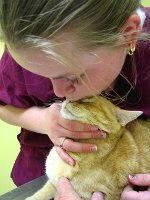Pets are such a dear part of our families. It is nearly impossible to imagine our days without them!
One of the great joys of life is bringing home a new puppy, kitten, or rescue pet from a local shelter. There is the promise of many happy moments during the lifetime of the pet. Each one is unique; each has a personality unlike any other dog or cat. And your interaction with that special family member is unique to you and the pet.
Maybe that’s why it is so difficult to experience that last “goodbye;” the physical connection you and your pet have nurtured is broken, the lively interaction will be no more; the sense of taking care of something that depends on you is gone. Memories, like shadows of a physical essence, are all you have left of your special friend. Most pets live a full, healthy, and safe life under the protection of their owners. Eventually, though, the body wears down from natural processes or disease, and youthful vigor is replaced by worn out, poorly repaired, malfunctioning organs and tissues. Without our intervention any dog or cat would die a “natural death.”
Unfortunately, well before natural death, the pet may experience very stressful, often painful days and nights, until eventually biochemical and circulatory breakdown is such that the body fails to support life. Unlike in human medicine, veterinary medicine provides an important niche in pet care where gentle and painless euthanasia is employed to assist the passing of a pet whose body no longer sustains life in an acceptable manner. The degree of pain, mental confusion, irreversible degeneration from kidney failure, cancer, or heart disease all play a role in our decision-making regarding when to euthanize a pet. Most pet owners have questions that need frank answers in order to reach a comfortable conviction that the time selected for euthanasia is the right time. The questions and answers below will assist you in determining “the right time.”
How will I know when it is the right time to put my pet to sleep?
 It's one of the most difficult decisions you have to make, but do what is best for your pet - even though that isn't always what is easiest for you.
It's one of the most difficult decisions you have to make, but do what is best for your pet - even though that isn't always what is easiest for you.
One simple rule is this: At the end of each day, rank your pet’s quality of life by one of two categories… was today a good day or a bad day. If your best care and medical treatments have been given and more bad days than good days are the norm, it is time to consider euthanasia.
How is it done?
Schedule the appointment at a time when full attention can be given to you and your pet. You can bring a favorite bed or crate to make your pet more comfortable.
The doctor will talk you through the procedure, which entails giving a special intravenous medication. The euthanasia solution will terminate nerve conduction and stop brain and heart activity. Within seconds of receiving the I.V. medication, most pets quietly relax, as if falling asleep, and pass away.
If a pet seems uncomfortable or afraid, a sedative can be administered prior to the injection.
Can it be done at my home?
The injection must be done carefully to ensure a smooth procedure. Only under unusual circumstances will euthanasia be done outside the hospital setting. 
The last thing you want to do is leave your pet alone. Bring your friends and family with you so your pet knows how much you love them.
Can I be with my pet when the doctor administers the euthanasia solution?
Yes. And you can bring friends or family members. If you are not allowed to be present when your pet is euthanized, find another veterinarian who does permit your presence.
How will I know for sure my pet has passed away?
You may see muscle movement after the injection is given which is not from conscious brain activity. Movements, if they occur at all, result from independent muscle contraction triggered by circulatory collapse. Some pets will lose urine or stool when nerve cells shut down. Most veterinarians will listen for a heartbeat to ensure your pet has passed.
Can I take my pet home after the euthanasia?
Yes; in fact you have three choices. You can take your pet home for burying private burial, have your pet cremated and the ashes returned to you, or leave the body at the animal hospital to be taken care of, which is usually done through a pet cremation service. Be sure to get answers to all of your questions well before the time of euthanasia.
Do I have to be present during the euthanasia?
No. Some people want to remember their pet’s healthy times and would be stressed by witnessing the pet’s passing. If you are unsure what to do, keep in mind some pet owners regretted not being at their pet’s side. Guilt creeps in through thoughts that they abandoned their pet in its final moments. Will you have regrets if you do not stay with your pet?
You can take a few minutes of private time alone with the pet after euthanasia. As a remembrance you can save a sample of fur. Some animal hospitals can make a plaster imprint of a paw for you, or make a paw print on a piece of paper. Bring a supportive friend or family member to do the driving after the event to enhance your safety on the heart-rending drive home.
What happens after my pet is gone?
Many animal hospitals send a sympathy card after pets have passed away, a thoughtful and courteous way to bring closure. However, some pet owners struggle with grief and sadness, and to get a sympathetic card only brings the event back to the surface. It’s perfectly polite to inquire if a card is customarily sent and to request none be sent if the effects might sadden you. Expect to have moments when you think you hear or see your pet. Time will resolve these impressions.
Friends may seem insensitive regarding your feelings after pet loss. You may hear such statements as “Get yourself another one,” or “Oh, you’ll get over it in a few days.” It may seem that empathy is missing, when in fact they simply don’t know quite what to say. The relationship you developed with your pet is very unique. Only you and your pet experienced its depth and beauty, and to describe the bond you had in words is at best just a shadow of the essence of the relationship. Only you will know how you feel after your pet is gone.
Do not berate yourself if sadness haunts you. Dismiss thoughts that you should just “get over it.” Instead, embrace the idea that you don’t need to get over it and probably never will. Just work on getting around it. Grief, regret, loneliness, and sadness must not encumber your life; when you learn to get around the loss of a loved pet, you will feel better. To your friends it will appear as if you’ve gotten over it… only you will know the permanent place in your heart where shadows of your beloved pet live forever.
About Dr. Dunn
Dr. Dunn graduated from the University of Illinois with a Doctor of Veterinary Medicine Degree in 1970. After working in a Chicago suburb he established the first small animal hospital in Rhinelander, Wisconsin. He also directed a mobile animal hospital that serviced outlying towns in northern Wisconsin in the early 1980s. He established another animal hospital in Eagle River, Wisconsin, and a third hospital in Rhinelander with a pet food and supply store attached.
In 1997 Dr. Dunn focused on the Internet to provide pet owners with sound advice about pet health care. That effort resulted in creation of ThePetCenter.com, The Internet Animal Hospital, in 1998, which he sold to PetFoodDirect.com. Dr. Dunn was appointed Director of Veterinary Services for PetFoodDirect.com, where he recruited and directed a nine veterinarian staff for the "Ask The Vet" program.
He practices small animal medicine and surgery in Naples, Florida, and northern Wisconsin. He wrote a monthly column for Dog World Magazine and continues to write feature articles on pet health care for various pet publications. Dr. Dunn is a member of several professional associations and is licensed to practice in Wisconsin and Florida. He enjoys internet commerce, veterinary medical photography, website design and content writing, fishing, and a variety of outdoor activities. Website: TheAnswerVet.com.



